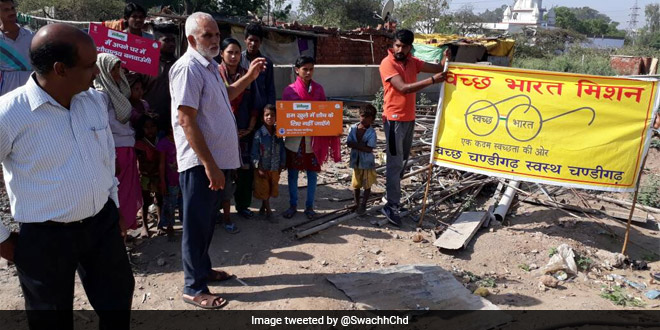Highlights
- Not enough green and blue dustbins distributed by the city’s civic body
- No effort yet to incorporate RWAs in the segregation initiative
- The only garbage processing plant in the city ceased operations in 2016
New Delhi: Like many of India’s civic bodies, the occasion of World Environment Day on June 5 was a highly anticipated one for Municipal Corporation (MC) Chandigarh. The civic body had launched the waste segregation programme with much fanfare on June 5, hoping to convince citizens to segregate waste. Around 15,000 blue and green coloured dustbins were procured by the civic body for handing out to residents of the city. More than 10 days since the launch of the waste segregation programme, not much has changed in Chandigarh as the old practice of disposing dry and wet waste together continues in the city.
10,000 bins were distributed to residents of Chandigarh on World Environment Day, and around 200 bins are still being distributed daily to residents. Despite such an effort, segregation at source is yet to be adopted by the citizens as many of them remain unaware of the process of segregation and cannot let go of the habit of disposing waste altogether. The problem of waste in Chandigarh has been a consistent and deeper analysis reflects how the problem laden civic body has, for years, failed to address the growing issue of waste in the city.
Segregation of waste becomes more important in Chandigarh, as the city has grappled with waste management issues for the past two to three years. Shortage of manpower and equipment has resulted in the municipal coprporation not being able to collect or transport waste generated by the city. Till the end of 2016, the civic body had more than 120 posts of safai karmacharis vacant, despite repeated requests to the Union Territory administration to begin the process of filling up the vacant posts. The civic body’s rate of Rs 100 per month, for collecting garbage from households has also not gone down well with the residents, it seems. Many are preferring to dispose the garbage themselves to save the monthly charge, and as a result, household waste collection and dumping is happening without segregation.
In order to save the monthly garbage collection charge, many residents are disposing the waste themselves. The problem is that lack of awareness on segregation results in them dumping everything altogether. The segregation campaign was launched to make people aware of what segregation is and how they can use two bins to segregate, but till now, the response has been quite dim, said Mr. Manoj Khatri, Joint Commissioner, Municipal Corporation Chandigarh.
Are solely the citizens to be blamed for not segregating waste? Not really, as many of them have not been supplied the blue-green bins, and neither has the segregation message been communicated to them. Unless awareness about segregation is in place, with emphasis on what consists of dry and wet waste and how effective segregation can be done and without adequate bins around, the habit of segregating waste will never catch up with residents. The civic body is also yet to send any notice to resident welfare associations (RWAs), seeking their cooperation in spreading awareness about segregation.
Segregation is a responsibility of the citizens, but for people who have become accustomed to dumping waste, it will take time. From July onwards, we will begin arranging segregation camps in all the sectors of the city, once we are done with distributing the dustbins,” said Mr. Khatri.
Segregation is important for Chandigarh, as the city isn’t well equipped to process garbage. The only garbage processing plant in the city, a privately owned one ceased its operations in July 2016, due to the civic body not adhering to its demand of Rs 1,000 a tonne as garbage processing fee. Further, some of the biggest garbage producing areas in Chandigarh, such as meat and vegetable markets see regular disposal of waste, but the civic body is yet to install colour coded dustbins in such areas. To address the problem of waste, the civic body will also begin imposing a fine of Rs 5,000 for dumping waste in residential areas, and Rs 10,000 for dumping waste in commercial areas, in the coming two to three months.
Once we are done distributing the bins by mid-July, we will begin a thorough segregation campaign, involving sanitation inspectors and RWAs, so that people know how to segregate. The imposition of fine will also discourage people from dumping waste in the open. We are hoping that these two steps would lessen the waste problem the city is facing currently, said Mr. Khatri.





























Sunny Sounta
June 19, 2017 at 12:36 pm
It is quite humorous that the so called modern people of India (in reality uncivilized) are being taught by the uncivilized and illiterate civic body of India….